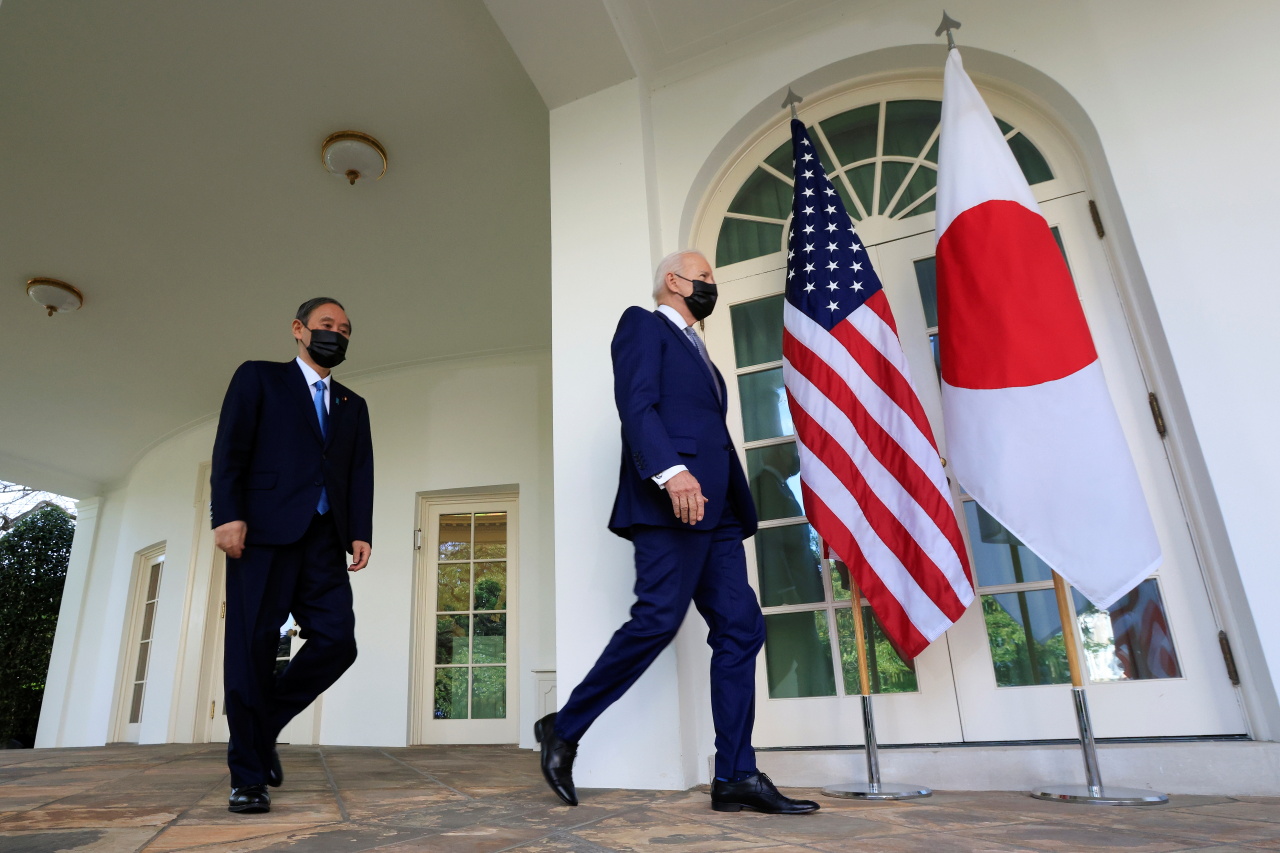Last week’s highly productive US-Japan summit has left few options for South Korean President Moon Jae-in, who is heading to Washington next month for a summit with the new US president, experts say.
US President Joe Biden and Japanese Prime Minister Yoshihide Suga presented a united front on China in their first face-to-face meeting on Friday.
The leaders reaffirmed their commitments to countering China’s continuing assertiveness over Hong Kong, Taiwan and the South China Sea, while pledging a whopping $4.5 billion to develop ultrafast communications technologies to prevent Huawei, China’s state-backed telecom giant, from dominating the global market.
“It’s almost like the US and Japan have announced a set of new global orders,” said Park Won-gon, a professor of North Korean studies at Ewha Womans University. “Now the only option left for South Korea is whether to join the initiative or not.
“It had been widely expected that China issues would loom large in the summit. But discussions were much more direct and specific than expected,” he added.
Biden, three months into his term, has invested heavily in rebuilding ties with Japan and South Korea amid the growing influence of China in the Indo-Pacific region.
Tokyo and Seoul were the first destinations of his administration’s highest-level foreign travel in March. With Suga and Moon becoming the first foreign leaders to meet Biden in person, the summit talks are considered the culmination of a flurry of diplomacy over the past months.
But South Korea has walked a fine line to avoid being drawn into the escalating US-China rivalry, while Japan has explicitly backed the US policy of challenging a more assertive China.
For Seoul, Beijing is more than just its biggest trading partner. South Korea has used its ties with China as leverage to engage with a defiant North Korea and put an end to its nuclear ambitions -- Moon’s signature policy goals.
With Washington’s new North Korea policy coming soon, Moon has expressed high hopes of reviving his mediating role in the collapsed diplomacy between the US and North Korea, whose relationship has reached a new low since the breakdown of the second summit talks between former President Donald Trump and North Korean leader Kim Jong-un in 2019.
“Moon may want to make a breakthrough in the stalled denuclearization talks through the upcoming summit with Biden. But the North Korea issue is not a top priority for the US president,” Park said. “Due to Korea’s strategic ambiguity, the Korea-US alliance could be reduced to a regional alliance tackling North Korea only.”
Hwang Jae-ho, a professor of international studies at Hankuk University of Foreign Studies, was also cautious about placing high expectations on the Moon-Biden summit, but made it clear “it’s not a competition with Japan either.”
Even for Suga, it was a tough decision to make a direct reference to Taiwan, China’s most sensitive territorial issue, during the joint press conference with Biden. China rebuked Japan immediately, warning of retaliatory action. Some critics in Japan criticized Suga for going too far, considering Japan’s dependence on trade with China.
“Suga, a diplomatic novice, seemed well-prepared. Upping the ante against China or North Korea is helpful for a Japanese prime minister to elevate approval ratings at home,” Hwang said, predicting a limited impact from China’s retaliatory threats due to Japan’s huge domestic market.
“But South Korea’s situation is much more complicated than that of Japan, which is a fact both the US and China are well aware of,” he added. “Rather than losing their crucial partner in the region at all, both countries will continue to gauge the situation, adjusting the pressure level.”
As for the “Quad,” an informal strategic alliance consisting of the US, Japan, India and Australia that aims to confront challenges from China, Park urged the South Korean government to join immediately in a clear sign of its alliance with the US. Meanwhile, Hwang said there is no need to rush when the US has not yet made an official request.
“There are not many things Moon can gain in the summit with Biden, especially at a time when inter-Korean relations have remained at a standstill,” Hwang said. “No serious confrontations between the two countries are expected at least under the two liberal presidents, except that time is running out for Moon, who is in his final year in office.”
By Lee Ji-yoon (
jylee@heraldcorp.com)







![[Today’s K-pop] Blackpink’s Jennie, Lisa invited to Coachella as solo acts](http://res.heraldm.com/phpwas/restmb_idxmake.php?idx=644&simg=/content/image/2024/11/21/20241121050099_0.jpg)
